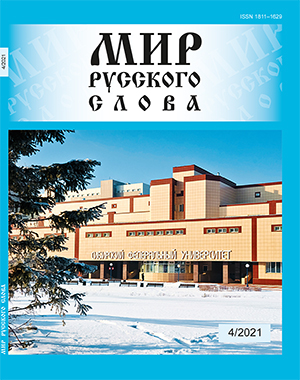The Lexeme Vesna as a Meansof Figurative Representation of the Internal State of a Person
DOI:
https://doi.org/10.24412/1811-1629-2021-4-55-64Abstract
The article examines the semantic development of the word ‘vesna’ (spring) based on the material of dictionary interpretations and texts of the 19th century Russian poetry. The relevance of the research is due to its appeal to the problems of lexical semantics and insufficiently studied aspects of the Russian national (poetic) picture of the world. The purpose of the study is to trace the appearance and to fix the ‘the inner state of a person’ figurative metaphorical meaning of the ‘vesna’ lexeme. Based on the component analysis of definitions from 12 explanatory dictionaries of the 18th – 19th centuries and linguo-stylistic analysis of 270 poetic contexts of the 19th century, extracted from the poetic subcorpus of the National Corpus of the Russian language, a number of conclusions are drawn about the peculiarities of the semantics and functioning of the ‘vesna’ lexeme in Russian language. The author proves that in explanatory dictionaries the lexeme ‘vesna’ has from one to four meanings, and in most definitions there are semes of a) direct temporal meaning ‘transitional season’, and b) figurative metaphorical meaning ‘physical condition’ (youth) and/or ‘emotional state’ (time of flowering, spiritual uplift). The novelty of the study lies in the fact that it describes a system of linguistic means, surrounded by which the lexeme ‘vesna’ acquires a metaphorical meaning of the ‘inner state of a person’, and that the article specifies the signs of “spring in the soul” or “spring in the life” of a person: this is a happy (“golden”) state, it is temporary, transient, fleeting, elusive, but returnable. ‘Vesna’ in poetic texts is metaphorically conceptualized as “air” or “liquid” penetrating into the “container” of heart, soul or body. The results of the study may be of interest to both linguists and literary critics and can be taken into account in the course of further study of the lexical and semantic system of the Russian language.
Keywords:
lexeme ‘vesna’ (spring), component-definition analysis, semantic development of the word, metaphorization, internal state, transitional state, Russian poetry of the 19th century
Downloads
References
Литература
References
Downloads
Published
How to Cite
Issue
Section
License
Articles of "The World of Russian Word" are open access distributed under the terms of the License Agreement with Saint Petersburg State University, which permits to the authors unrestricted distribution and self-archiving free of charge.




